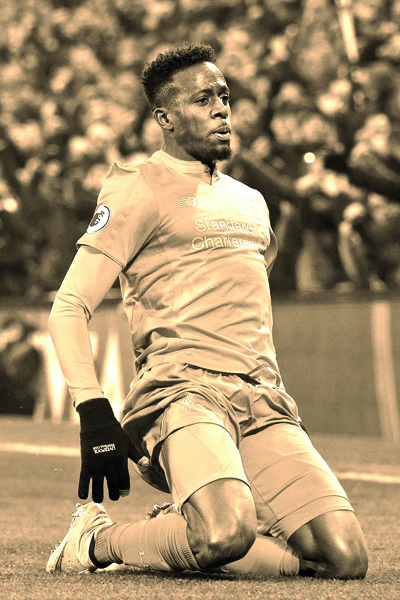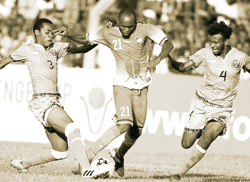
Kenya has produced many great strikers; Elijah Lidonde, William Chege Ouma and Joe Masiga immediately come to mind. But Dennis Oliech was Kenya’s first international football celebrity. He happened on the scene during the globalisation era, in the age of the internet. He certainly wasn’t our greatest striker, but he was a talent above his peers, and blazed his way first to Qatar and then to France. He remains the best striker of the contemporary era.
After him came MacDonald Mariga and Victor Wanyama, his successor as Harambee Stars’ captain, and then so many others playing in second and third tier leagues in Europe. His trail blazing brought him fame and some measure of prosperity, something that could enable him to speak his mind to power. Since he burst into the national team scene as the long-sought successor to J.J. Masiga, Dennis Oliech has been both a purveyor and recipient of direct language.
Oliech became a difficult player for his coaches at Harambee Stars when he sometimes disappeared from camp and was seen having a good time contrary to team orders. But when he refused to play until money that he had spent on tickets was refunded, many Kenyans understood him. He was asking for his just right.
The ruse of shouting patriotism as cover for incompetence and corruption had to be exposed for what it was. Some frustrated officials accused him of arrogance when dealing with his peers and managers and of being a poor role model arising from his nocturnal misadventures.
He in turn accused sponsors and managers of the national team of fleecing him and using his star image for their own gain. For this, he earned a nickname: ‘Dennis the Menace.’ Oliech’s contemporaries have followed a totally different path. Divock Origi, born of Kenyan parents in Belgium, opted for Belgian citizenship. He is the scion of a great footballing family; both his father, Mike Okoth and uncle, Austin Oduor, were Harambee Stars players.
In 2014, Origi was called up by his adopted country to play in the 2014 World Cup in Brazil. He did not disappoint. The World Cup is the ultimate show on earth and Origi took it by storm. He became one of the great revelations of the 2014 edition which for Kenya remains associated with him. With his every move, an old Kodak film advertising slogan came to mind: let the memories begin. He made Belgium a lovely name to pronounce and Kenyans appropriated every Belgian success as if it were achieved by Harambee Stars.
At 19, Origi put his name in the books as Belgium’s youngest World Cup scorer. It was his star show in Brazil that led him to a memorable signing with English giants Anfield. Unfortunately, he hasn’t followed through with his highly promising start. He failed to make it to Belgium’s team for the 2018 World Cup in Russia. Still, at only 23, he cannot be ruled out and he may yet have a resurgence of fortunes.
His uncle, Austin Oduor, the only captain of a Kenyan team to hold aloft a continental cup, said of his nephew: “With his performance, it is evident that we can produce good players.
I don’t know what positive effect this will have on Kenya but I think it entirely depends what new technologies are introduced in our game by its managers. Doing things the old way means we remain where we are. And of course, the very first thing to do is to be transparent with money; to be honest with it to a fault.”

Austin Oduor, who made his debut for Gor Mahia at 17, was the founder of the Origi dynasty. His son and Divock’s cousin, Arnold Origi, played in goal for Kenya for several years before switching nationality to Norwegian.
Divock’s father, Mike Okoth played for Shabana, Tusker and was one of Kenya’s early professionals of the modern era when he turned out for Gent in Belgium. The other well-known members of the Origi family are Anthony and Gerald, who guided Utalii FC to their first Kenya Premier League victory in 1997.
Tusker, as Kenya Breweries almost repeated that feat in 1994 but a catastrophic final against DR Congo’s Motema Pembe meant that that was the best a Kenyan team has so far done in trying to repeat Gor Mahia’s 1987 achievement. The Kenya national team first qualified for the Africa Cup of Nations in 1972 and last did so in 2004.
Victor Wanyama and his brother, McDonald Mariga, are also part of one of a Kenyan football dynasty. The father of the two boys, Noah Wanyama, known to fans and sports writers of his day as Landi Mawe, played for Harambee Stars at both Number 10 and Number 11. Mariga, who played for Parma in Italy and Wanyama, who plays for Tottenham Hotspur in the English Premier League, are so far the most successful professional footballers in the country. Victor has also been captain of the national team for a number of years.
Between them, these players have tried and failed to do what their parents’ generation achieved earlier. Kenya first served notice of its intentions in the African continent when Gor Mahia reached the final of the Africa Cup Winners Cup in 1979. The club failed to get past Cameroon’s Cannon Yaoundé, losing 8-0 in aggregate but made amends for that in 1987 when they beat Tunisia’s Esperance Sportif at the Moi International Sports Complex, Kasarani.
Tusker, as Kenya Breweries almost repeated that feat in 1994 but a catastrophic final against DR Congo’s Motema Pembe meant that that was the best a Kenyan team has so far done in trying to repeat Gor Mahia’s 1987 achievement. The Kenya national team first qualified for the Africa Cup of Nations in 1972 and last did so in 2004.
